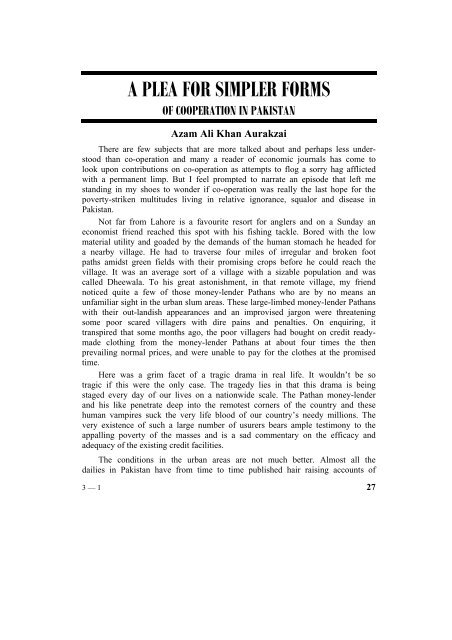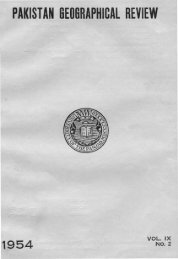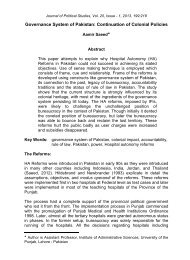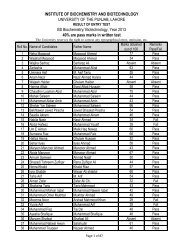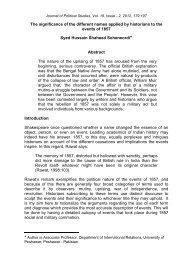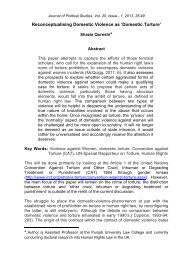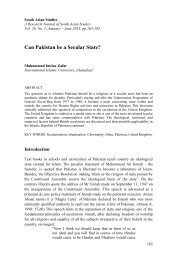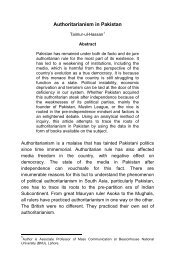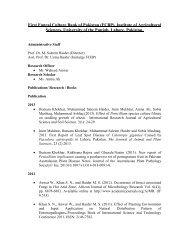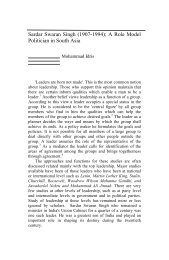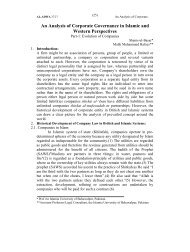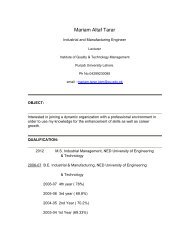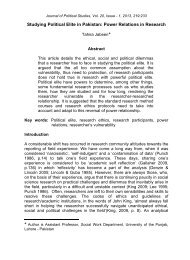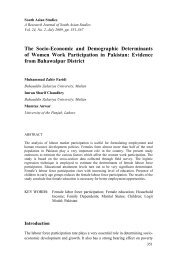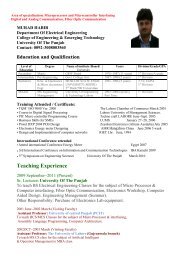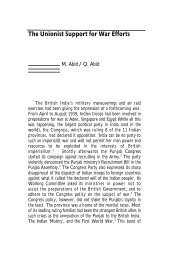4 AURAKZAI A Plea for Simpler Forms of Cooperation-1955.pdf
4 AURAKZAI A Plea for Simpler Forms of Cooperation-1955.pdf
4 AURAKZAI A Plea for Simpler Forms of Cooperation-1955.pdf
Create successful ePaper yourself
Turn your PDF publications into a flip-book with our unique Google optimized e-Paper software.
A PLEA FOR SIMPLER FORMS<br />
OF COOPERATION IN PAKISTAN<br />
Azam Ali Khan Aurakzai<br />
There are few subjects that are more talked about and perhaps less under-<br />
stood than co-operation and many a reader <strong>of</strong> economic journals has come to<br />
look upon contributions on co-operation as attempts to flog a sorry hag afflicted<br />
with a permanent limp. But I feel prompted to narrate an episode that left me<br />
standing in my shoes to wonder if co-operation was really the last hope <strong>for</strong> the<br />
poverty-striken multitudes living in relative ignorance, squalor and disease in<br />
Pakistan.<br />
Not far from Lahore is a favourite resort <strong>for</strong> anglers and on a Sunday an<br />
economist friend reached this spot with his fishing tackle. Bored with the low<br />
material utility and goaded by the demands <strong>of</strong> the human stomach he headed <strong>for</strong><br />
a nearby village. He had to traverse four miles <strong>of</strong> irregular and broken foot<br />
paths amidst green fields with their promising crops be<strong>for</strong>e he could reach the<br />
village. It was an average sort <strong>of</strong> a village with a sizable population and was<br />
called Dheewala. To his great astonishment, in that remote village, my friend<br />
noticed quite a few <strong>of</strong> those money-lender Pathans who are by no means an<br />
unfamiliar sight in the urban slum areas. These large-limbed money-lender Pathans<br />
with their out-landish appearances and an improvised jargon were threatening<br />
some poor scared villagers with dire pains and penalties. On enquiring, it<br />
transpired that some months ago, the poor villagers had bought on credit readymade<br />
clothing from the money-lender Pathans at about four times the then<br />
prevailing normal prices, and were unable to pay <strong>for</strong> the clothes at the promised<br />
time.<br />
Here was a grim facet <strong>of</strong> a tragic drama in real life. It wouldn’t be so<br />
tragic if this were the only case. The tragedy lies in that this drama is being<br />
staged every day <strong>of</strong> our lives on a nationwide scale. The Pathan money-lender<br />
and his like penetrate deep into the remotest corners <strong>of</strong> the country and these<br />
human vampires suck the very life blood <strong>of</strong> our country’s needy millions. The<br />
very existence <strong>of</strong> such a large number <strong>of</strong> usurers bears ample testimony to the<br />
appalling poverty <strong>of</strong> the masses and is a sad commentary on the efficacy and<br />
adequacy <strong>of</strong> the existing credit facilities.<br />
The conditions in the urban areas are not much better. Almost all the<br />
dailies in Pakistan have from time to time published hair raising accounts <strong>of</strong><br />
3 — 1 27
A PLEA FOR<br />
the abject poverty and hand-to-mouth existence <strong>of</strong> the slum-dwellers and the<br />
low paid white-collar workers and the disgustingly extortionist policy <strong>of</strong> the<br />
petty Pathan usurers. The modus operendi <strong>of</strong> the Pathan money-lenders was<br />
vividly portrayed in a letter published sometimes, back in an English daily newspaper.<br />
I give here an extract from the same. “It is universally known that the<br />
Pathans advance loans to their needy victims by getting a pronote <strong>for</strong> exactly<br />
double the amount actually advanced, and even out <strong>of</strong> the actual advance they<br />
deduct interest <strong>for</strong> the first month in advance calculated at an exorbitant rate <strong>of</strong><br />
Re. -/2/- per rupee on the amount <strong>of</strong> the pronote, or 25% a month — since<br />
the pronote is <strong>for</strong> double the amount. Thus a person executing a pronote<br />
<strong>for</strong> Rs. 200/-/- actually gets an advance <strong>of</strong> Rs. 75/-/- and on pain <strong>of</strong> violence, is<br />
faced with a demand <strong>of</strong> Rs. 25/-/- every month towards interest.” All <strong>of</strong> this<br />
points in one direction: No planned, or even a serious ef<strong>for</strong>t on a compre-<br />
hensive scale, has as yet been, made to ameliorate the circumstances <strong>of</strong> the<br />
persons with small means. The feelings <strong>of</strong> dissatisfaction, hopelessness and in<br />
general a disgruntled attitude towards life, breed fatalism among the ignorant<br />
masses and unless quick and positive steps are taken to give them hope <strong>for</strong> a<br />
better life, they are prone to fall an easy prey in the hands <strong>of</strong> those <strong>for</strong>ces that<br />
are willing to exploit them. Machiavelli wrote about four hundred years ago<br />
that ‘a hungry man is a potential revolutionary’. To-day, it is axiomatic. The<br />
communist technique <strong>of</strong> exploitation <strong>of</strong> hungry and backward Asiatic countries is<br />
based on this fact. President Truman in his inaugural address <strong>of</strong> Jan. 20, 1949,<br />
said, “More than half the people <strong>of</strong> the world are living in conditions approach-<br />
ing misery. Their food is inadequate. They are victims <strong>of</strong> disease, their economic<br />
life is primitive and stagnant. Their poverty, is a handicap and a threat both<br />
to them and to more prosperous areas.” What Mr. Truman said in 1949,<br />
applies to Pakistan word by word. No doubt, we in Pakistan have withstood<br />
the indignities <strong>of</strong> time, “both at the time <strong>of</strong> the Partition and after, with a greater<br />
determination and <strong>for</strong>titude than any other nation can boast <strong>of</strong>; because we are<br />
Muslims and as such we lay a premium on the life hereafter as compared to our<br />
earthly existence. We, there<strong>for</strong>e, in spite <strong>of</strong> our grievances against life might<br />
continue to face hardships that flesh and blood can endure. But a complacent<br />
attitude towards the. patient sufferings <strong>of</strong> our masses would never be <strong>for</strong>given by<br />
History and the posterity will condemn to-day’s leaders <strong>of</strong> thought and action as<br />
hopeless bankrupts.<br />
Most rational thinkers would strongly advocate co-operation as the best hope<br />
<strong>of</strong> the person with £mall means in Pakistan, may he be an agriculturist, an artisan,<br />
a petty trader or even a consumer. As a firm believer in the theory <strong>of</strong> co-opera-<br />
tion, I am convinced <strong>of</strong> its immense utility in organizing the economic life <strong>of</strong> the<br />
28 3 — 1
SIMPLER FORMS OF COOPERATION<br />
persons <strong>of</strong> small means in Pakistan, but I suggest simpler <strong>for</strong>ms <strong>of</strong> co-operation<br />
instead <strong>of</strong> the red-tape-ridden hybrid <strong>of</strong> co-operation that exists in Pakistan to-day.<br />
The Government sponsored co-operatives in Pakistan have played an<br />
important role in helping to re-organize the economic life <strong>of</strong> the country at a time<br />
when the economy had been dislocated due to exodus <strong>of</strong> non-Muslim financiers<br />
and money-lenders from Pakistan at the time <strong>of</strong> Partition. But all this work was in<br />
connection with taking over and re-organizing big business — ginning factories,<br />
rice-husking mills, flour mills, etc. — enterprises which can best be organized on a<br />
joint stock basis. However, in spite <strong>of</strong> the good work done by the co-operatives, at<br />
the time <strong>of</strong> Partition, the fact remains that the cooperatives had diverted their<br />
attention from the village to big business and commercial undertakings and in<br />
doing so the primary objective <strong>of</strong> cooperation, i.e., helping the isolated and<br />
powerless individuals was thrown in the background.<br />
The theory <strong>of</strong> cooperation, as laid down in the Maclagan Committee Report is<br />
that ‘an isolated and powerless individual can, by association with others and by<br />
moral development and mutual support, obtain, in his own degree, the material<br />
advantages available to wealthy or powerful persons, and thereby develop himself<br />
to the fullest extent <strong>of</strong> his natural abilities. By the union <strong>of</strong> <strong>for</strong>ce material<br />
advancement is secured, and by united action, self-reliance is fostered, and it is<br />
from the interaction <strong>of</strong> these influences that it is hoped to attain the effective<br />
realization <strong>of</strong> the higher and more prosperous standard <strong>of</strong> life which has been<br />
characterized as better business, better farming and better living.’<br />
In the sphere <strong>of</strong> moral reorganization, there<strong>for</strong>e, we can visualize no <strong>for</strong>m <strong>of</strong><br />
organization so suited to our conditions as the cooperative, because by the<br />
abandonment <strong>of</strong> competition in production and distribution and elimination <strong>of</strong><br />
middlemen <strong>of</strong> all kinds, there is every certainty <strong>of</strong> improving the farmers’ life by<br />
producing permanent results.<br />
Now, let us examine as to what extent the present cooperative organization has<br />
achieved or can possibly achieve the a<strong>for</strong>ementioned objective <strong>of</strong> realizing ‘higher<br />
and more prosperous standard <strong>of</strong> life which has been characterized as better<br />
business, better farming and better living.’<br />
There are at present 50,000 cooperative societies in Pakistan with a total<br />
membership <strong>of</strong> 3,700,000. Assuming that a family consists <strong>of</strong> five persons on the<br />
average this membership means that only 18,500,000 peoples are benefitting from<br />
the cooperative institutions amongst a total agricultural population <strong>of</strong> more than<br />
55,000,000. The total amount <strong>of</strong> working capital <strong>of</strong> such cooperative institution has<br />
been estimated at only Rs. 52 crores or Rs. 2.88 per person or Rs. 14/- per member.<br />
3 — 1 29
A PLEA FOR<br />
Loans and advances <strong>of</strong> cooperative bank in Pakistan at the end <strong>of</strong> 1949 were<br />
estimated at Rs. 4.6 crore. If we divide this amount by the proportion <strong>of</strong> population<br />
benefitting from; the cooperative institutions, the result would be anything but<br />
encouraging. The latest figures regarding the total amount <strong>of</strong> advances are not<br />
available. However, even if we assume the figures to have doubled in 1955, the<br />
advance per head <strong>of</strong> the people benefitting from the cooperative institutions would<br />
hardly exceed annas eight. It is no wonder that the Pathan money-lender and his<br />
like thrive in this country. Under the circumstances it does not require a knowledge<br />
<strong>of</strong> advanced mathematics to arrive at the conclusion that the present cooperative<br />
finance is far from adequate to meet the agricultural credit needs <strong>of</strong> Pakistan.<br />
A mere faith in the potentialities <strong>of</strong> cooperation is not <strong>of</strong> .any help in ensuring<br />
progress. The mere fact that cooperation is desirable does not warrant the creation<br />
<strong>of</strong> an efficient cooperative organization.<br />
On recommendation from a friend and on being dubbed as an armchair<br />
economist I went to a representative village and saw the working <strong>of</strong> a cooperative<br />
society <strong>for</strong> myself. On being assured that I was not a government <strong>of</strong>ficial nor<br />
connected with cooperatives, the village cooperators felt relieved and relaxed and<br />
very soon became cordial. This change <strong>of</strong> attitude towards me on my being<br />
discovered as merely an inquisitive citizen, amply showed the degree <strong>of</strong> warmth<br />
these people must be having <strong>for</strong> the government <strong>of</strong>ficials especially the ones<br />
belonging to the Cooperative Department. The village cooperators considered the<br />
cooperative <strong>of</strong>ficials as outsiders, and a much too frequent charge on their<br />
hospitality. I was told this by an amiable youngman who had the distinction <strong>of</strong><br />
being a matriculate in that village. He was very helpful in explaining to me the<br />
amount <strong>of</strong> book keeping, noting, checking inspection, etc., that was carried out in<br />
connection with their cooperative society. The whole affair looked so complicated<br />
that I questioned some other cooperators also as to whether they knew how the<br />
cooperative society worked. To my disappointment they shook their heads and<br />
smiled to supplement their ignorance. How could people who cannot count beyond<br />
twenty and <strong>of</strong>ten express the price <strong>of</strong> a thing as ‘so many twenties’ be expected to<br />
understand the principles <strong>of</strong> liability and book keeping etc.? Moreover, I was also<br />
told by some <strong>of</strong> the cooperators that loans weren’t always available however<br />
genuine the need, and under such circumstances in spite <strong>of</strong> their being members <strong>of</strong><br />
the cooperative society, they were constrained to look to other sources <strong>for</strong> credit.<br />
They also complained <strong>of</strong> discrimination in the matter <strong>of</strong> loans. Obviously the<br />
villagers did not consider the cooperative society as something their own, and as<br />
such the cooperation did not come from within the people; it was therein the name<br />
but not in spirit. Un<strong>for</strong>tunately the government agencies have not been able to win<br />
the confidence <strong>of</strong> the people. On the contrary, serious lapses <strong>of</strong> sincerity in practice<br />
30 3 — 1
SIMPLER FORMS OF COOPERATION<br />
are not very uncommon and this in turn, not only sets a bad example but also<br />
shakes the confidence <strong>of</strong> the public. To quote one instance, in regard to the<br />
government loans to the needy cultivators, the public received a rude shock when<br />
recently in reply to a question from one <strong>of</strong> the members in the Punjab Assembly, it<br />
came to light that considerable sums <strong>of</strong> money had been lent by the Government to<br />
well-to-do and influential Zamindars rather than the poor cultivators!<br />
May it be said that the cooperative spirit is not sufficiently intense among us?<br />
In my opinion it would not be correct to say so. A very interesting manifestation <strong>of</strong><br />
the cooperative spirit and attitude is to be seen in the popularization <strong>of</strong> credit pools<br />
called ‘kameti’ among urban as well as rural groups. These are both large and small<br />
and the daily, weekly or monthly individual contributions vary from four annas or<br />
even less to sizable small sums. In the middle class and poor quarters <strong>of</strong> Lahore and<br />
other Punjab towns there is perhaps hardly a care-worn housewife who is not a<br />
member <strong>of</strong> any <strong>of</strong> these ‘kametis’. These pools have increased very considerably<br />
after the exodus <strong>of</strong> the bania from our society and have in a large measure served<br />
the function <strong>of</strong> accumulation <strong>of</strong> petty capital which was previously served by the<br />
bania money-lender on terms very unfavourable to the community. (It may be<br />
mentioned in the passing that the Pathan money-lender is a poor substitute <strong>for</strong> the<br />
bania even though more than his equal in nuisance value). Tens <strong>of</strong> thousands <strong>of</strong><br />
these pools must be in existence today and a statistical census <strong>of</strong> these would reveal<br />
the extent to which the spirit <strong>of</strong> mutual help and organization exists among our<br />
people.<br />
So the attitude and spirit needed <strong>for</strong> cooperation is present in a high measure<br />
among people most likely to benefit from cooperation.<br />
<strong>Cooperation</strong> in Pakistan should, in the first place, be guided by the watch<br />
words ‘Face to the Village’ since more than ninety per cent <strong>of</strong> our population lives<br />
in the villages and it is in the villages where the primary role <strong>of</strong> cooperation lies.<br />
The diversion <strong>of</strong> attention from the sphere <strong>of</strong> rural life to big business and<br />
commercial undertakings is not only undesirable but definitely harmful to the cause<br />
<strong>of</strong> cooperation.<br />
Secondly, to begin with cooperation in its simpler <strong>for</strong>ms should be taken up<br />
where the bulk <strong>of</strong> the credit transactions may be in kind. Cooperative societies<br />
accepting deposits in the shape <strong>of</strong> grain annually at harvest time and granting petty<br />
advances when necessary. These advances may be in the <strong>for</strong>m <strong>of</strong> seed, grain <strong>for</strong><br />
consumption or even clothing.<br />
Thirdly, the procedure <strong>of</strong> book keeping, chocking, inspection, etc., that are<br />
usual features <strong>of</strong> our existing system must be reduced to a minimum. In the<br />
3 — 1 31
A PLEA FOR<br />
‘kameti’ referred to elsewhere in this paper, book keeping <strong>of</strong> any complicated type<br />
does not exist and yet there is hardly ever a case <strong>of</strong> any money being lost.<br />
Incidently, the ‘kameti’ itself is a simpler <strong>for</strong>m <strong>of</strong> cooperation which merits<br />
“serious consideration in as much as it already exists in most <strong>of</strong> towns and villages<br />
and can easily <strong>for</strong>m the nucleus <strong>of</strong> cooperative activity.<br />
Fourthly, training and education should be considered an integral part <strong>of</strong> cooperation.<br />
The bulk <strong>of</strong> rural population in Pakistan is illiterate and as such can<br />
exercise practically no control over the doings <strong>of</strong> their <strong>of</strong>fice bearers or their paid<br />
employees.<br />
Fifthly, ‘the influential section <strong>of</strong> the community’ must be looked upon as a<br />
danger to the, institution <strong>of</strong> cooperation. Our men <strong>of</strong> influence and position are<br />
used to privileges <strong>of</strong> all sorts, and they tend to think that they can elbow out the<br />
poorer individuals as a matter <strong>of</strong> right. The moment this happens the spirit <strong>of</strong><br />
cooperation is destroyed. Cooperatives must, there<strong>for</strong>e, be made <strong>of</strong> people <strong>of</strong> a<br />
uni<strong>for</strong>m level <strong>of</strong> social standing and political influence.<br />
The cooperative societies thus evolved would render far more genuine service<br />
in organizing the social and economic life <strong>of</strong> the bulk <strong>of</strong> our population. In fact this<br />
simplified cooperation would <strong>for</strong>m the nucleus <strong>of</strong> all solid economic re<strong>for</strong>ms so<br />
desirable, yet so evasive, <strong>for</strong> want <strong>of</strong> a simple and efficient basic organization.<br />
—— - ——<br />
32 3 — 1


